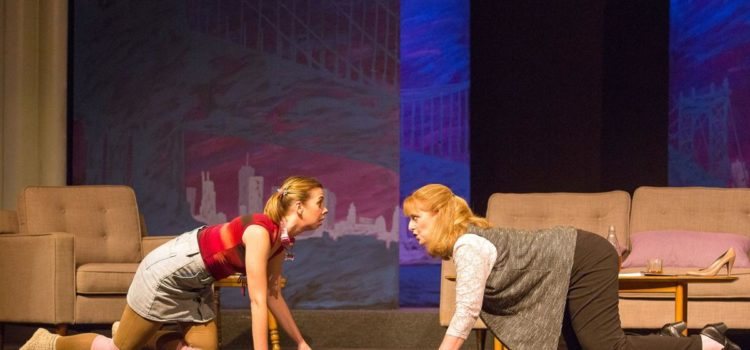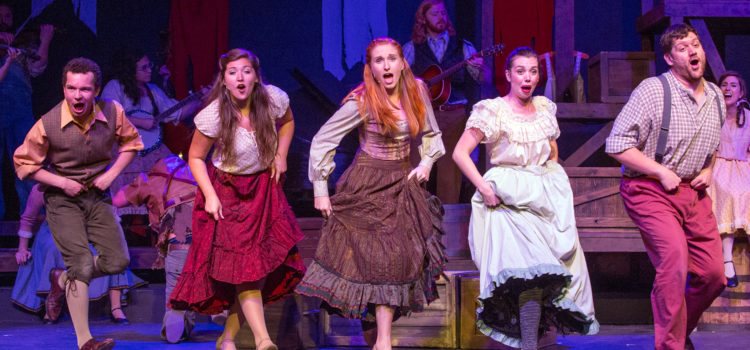By Lynn Venhaus
Managing Editor
Oh, that puppy love. American playwright A.R. Gurney’s absurd comedy “Sylvia” presents
a marital conflict caused by a pretty pooch. In this case, the mutt takes on
human form and talks in perfect English. To buy into the conceit is to believe
the female fur child in its interaction with her male best friend, and it’s apparent
they are a tad too close.
That’s the premise in this drawing-room comedy, originally set in the 1980s, which first appeared off-Broadway in 1995, starred Matthew Broderick and Annaleigh Ashford in a limited Broadway engagement in 2015 and has become a favorite of adventurous theater troupes and dog lovers everywhere.
In Stray Dog Theatre’s production, energetic Susie Lawrence is expressive as the preening and prancing puppy that Greg takes a shine to in NYC’s Central Park. Wearing knee pads and modern girlie outfits, Sylvia — the name’s on her tag — happily makes herself at home in an Upper West Side apartment where an empty-nest couple have started the second chapter of their life, now that the kids are grown.
Kate and Greg are a cookie-cutter WASP pair, married 22 years. Likeable Kay Love and Tim Naegelin are the longtime married couple whose relationship begins to unravel when the dog comes between them. Is he just going through a mid-life crisis or does the obsession signal more? It could be construed as a romantic triangle on the icky side.
The trouble with the husband and wife characters is that
they’re bland. And there is not much to like about the generic one-note Kate,
who is back to work teaching and working on a master’s degree in English. Irritated
the minute she’s introduced, Kate takes an immediate dislike to the dog and
tried to veto it becoming part of the family. She refers to the dog as Saliva,
which is no longer funny after the first reference.
Greg appears adrift and gains no sympathy as he does nothing to repair things
with his wife. He has lost his mojo as a financial analyst after the kids left.
He doesn’t much like his job, quarrels with his boss, and starts spending more
and more time doting on Sylvia. Playing with a dog outdoors is healthy for all,
right?
Well, not exactly, because the affection becomes creepy when Greg would rather be with the flirty dog than with humans. And it’s the only time vanilla Greg lights up.
Kate doesn’t ring true about her all-consuming hatred of the dog right away, while Greg’s bizarre behavior would alarm a therapist much quicker than when he eventually gets to one. Kate’s aggravation at the dog should grow as Sylvia chews shoes, sheds all over the couch, leaves puddles and encroaches on her personal space. The exasperation needed to build, not be at the same level as the beginning.
Photo by John LambAs the therapist in the second act, a New Age eccentric named Leslie who purposely does not want to be defined by any gender, Melissa Harlow is a hoot – and the visual sight gag of her tacky velour purple top and gold-print black palazzo pants is as amusing as her goofy accent, not unlike Martin Short as the wedding planner in “Father of the Bride.”
In fact, with her comic flair Harlow steals the whole shebang portraying three characters, two in the first act. Experienced at interactive comedy shows and mystery dinner theater where she works in St. Louis, she is the breakout star here.
Melissa Harlow and Kay Love. Photo by John Lamb
Laugh-out-loud funny as Phyllis, a typical but high-strung socialite who becomes unnerved by Sylvia’s over-enthusiastic greeting, Harlow had the audience howling as she became more agitated and unglued. The gifted comic actress recalls the classic sketches on “The Carol Burnett Show” or “Saturday Night Live.”
Her first character, Tom, is a ‘bro,’ a guy in the park who shares way too much information with Greg about interpersonal relationships and dog psychology.
Harlow is believable as all three – and it’s customary for one person to play them all. She brightened every scene she’s in, for as two acts progress in nearly two and a half hours, the play gets repetitive and somewhat tedious. Gurney could have tied everything up in a one-act because basically it’s an extended one-joke play and drags getting to its predictable conclusion.
Because she’s so animated, Lawrence is in contrast with the dull couple. That’s why Harlow’s antics are such a bright spot as well.
In the larger picture, Gurney, famous for his piercing look at the privileged Manhattanites in such works as “The Cocktail Hour” and “The Dining Room,” is making a bigger statement about humans’ desperate need to connect in an impersonal world, even if it’s with an animal.
Now that rings true. Gurney, whose best-known play is “Love Letters,” inexplicably falls back on tired clichés. The play could have benefited from more biting wit and frank social analysis.
Director Gary F. Bell has updated its time, now in 2000. He makes use of the Tower Grove Abbey’s small confines well, allowing frisky Lawrence to scamper about in scenic designer Miles Bledsoe’s suitable living quarters interior, with interesting skyline pieces as background.
Without opening up the play, it could be claustrophic. The outdoor scenes help change the scenery.
Bell dedicated the show to his own canine companion, Oliver Ogden Bell, and includes some choice quotes in the program as director’s notes, including this gem from John Steinbeck: “I’ve seen a look in dogs’ eyes, a quickly vanishing look of amazed contempt, and I am convinced that basically dogs think humans are nuts.”
No one is credited with sound, but the selection of music interludes is always pitch-perfect, whether it was Bell or Associate Artistic Director Justin Been. Use of the Cole Porter song, “Ev’ry Time We Say Goodbye,” which is included with the script, is a lovely rendition because the cast has good voices.
If you are a ‘dog person,’ you might not mind the contrasts in tone, or the depicted fantasy. “Sylvia” is one of those plays that divides people, depending on their point of view. The cast and crew put forth a terrific effort, but to me, the playwright barks up the wrong tree.
Tim Naegelin and Susie Laawrence. Photo by John LambStray Dog Theatre presented “Sylvia” June 6 –
June 22 at the Tower Grove Abbey. For more information about the professional
theater troupe and their new season, which starts in August, visit
www.straydogtheatre.org

Lynn (Zipfel) Venhaus has had a continuous byline in St. Louis metro region publications since 1978. She writes features and news for Belleville News-Democrat and contributes to St. Louis magazine and other publications.
She is a Rotten Tomatoes-approved film critic, currently reviews films for Webster-Kirkwood Times and KTRS Radio, covers entertainment for PopLifeSTL.com and co-hosts podcast PopLifeSTL.com…Presents.
She is a member of Critics Choice Association, where she serves on the women’s and marketing committees; Alliance of Women Film Journalists; and on the board of the St. Louis Film Critics Association. She is a founding and board member of the St. Louis Theater Circle.
She is retired from teaching journalism/media as an adjunct college instructor.


